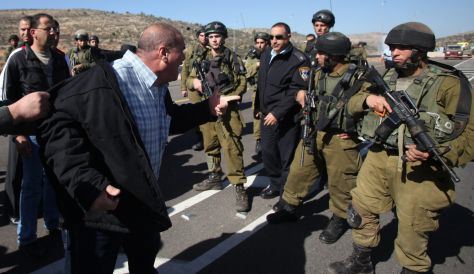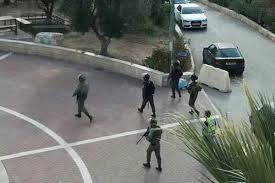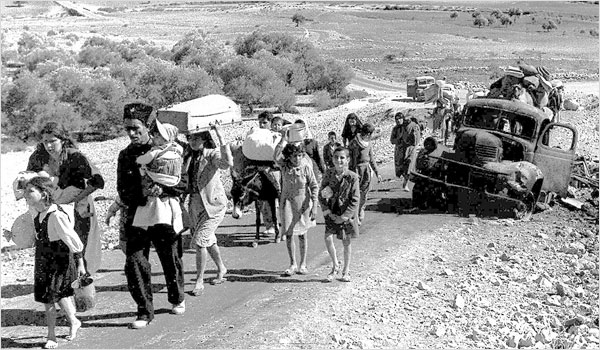Tensions in the West Bank are rising, together with IDF, settler violence
 Friday, January 31, 2014 at 04:32PM
Friday, January 31, 2014 at 04:32PM http://www.haaretz.com/news/middle-east/.premium-1.571718
2013 sees escalation in IDF activity against Palestinians, and Palestinian popular resistance to arrests is on the rise, UN report says.
By Amira Hass | Jan. 31, 2014 | 8:22 AM
About an hour after Dr. Mustafa Barghouti’s Wednesday afternoon talk on the extreme tension gripping the West Bank, which is liable to erupt at any time and in any place, a group of youngsters from the Jalazun refugee camp clashed with Palestinian police. Angry posts on Facebook suggested they fight those with whom
they should be fighting – the Israeli army.

About three weeks ago, a clash took place near the camp, north of Ramallah. Residents blocked major roads in protest of the public and government’s lack of interest in the rapidly deteriorating situation there, which was set off by a prolonged UNRWA workers’ strike. On Wednesday, there was a confrontation in central Ramallah. This time, the youngsters came out in droves from the hospital in the center of town, demanding that local shops and restaurants close in solidarity with their friend, Mohammad Mubarak, who was killed by IDF troops two hours earlier. Storeowners refused to heed the youths’ calls, and Palestinian police began shooting in the air to chase the youths away.
Some of them were arrested and beaten by police, a camp resident told Haaretz. Underneath the patriotic, nationalist character of the young protesters’ demands to close the shops hid the matter of economic status, which isn’t often discussed in the open: Ramallah has become a symbol of the huge gaps between wealthy Palestinians and all the others, particularly the refugees. One man willing to speak about this issue openly, with Haaretz as well, is the head of the Jalazun camp’s popular committee, Fatah member Mahmoud Mubarak. On Thursday, he sat in mourning at the Jalazun camp, and staunchly denied the Israeli version of the events surrounding his son’s death.
According to the IDF Spokespersons’ unit, the younger Mubarak opened fire on troops exiting a guard post, and was killed when the soldiers returned fire. According to the family and Palestinian media, the 21-year-old had been working for three weeks on a Palestinian ministry public works project to repair a local road, funded by USAID. His job was directing traffic.
Finding a job – even if it’s only for four months, like this one – takes a great deal of luck. The soldiers, according to the Palestinian reports, humiliated Mubarak, beat him, made him take off his road safety vest, made him run back and forth, and then shot him. “Executed in cold blood,” read the newspaper headlines. He wasn’t holding a weapon. Maher Ranim, Palestinian minister of public works and housing, was quick to release a statement casting doubt on the Israeli version of events. The sensitivities here are clear: the contractor and the Palestinian public works ministry are responsible for the political faithfulness of the workers. The American government has become the largest benefactor to the Palestinian Authority (and UNRWA) in recent years, and all ministry workers, contractors, or anyone else who receives aid, must sign a declaration that they do not support terror.
On Thursday, the soldiers at the post had already been rotated out. One of the new ones relayed what he heard from his friends. “A day earlier they spoke with him [Mubarak] asked him if he wanted water,” said the soldier. “The bullet holes in the concrete aren’t that big, because of the distance he shot from, and the weak weapon he used,” explained the soldier. The soldiers concurred that it wasn’t smart for him to shoot: he was in an open area, completely exposed to the soldiers at the post.
The irrationality of the shooting from such an exposed place actually backs up the story told by the boy’s father. On Thursday, a seven minutes’ drive away from Jalazun, in a sunny courtyard near Jalazun’s event hall, the family received hundreds of condolers. “He went to work just like any other Wednesday. Where could he have gotten a weapon from?”
Many find it easy to accept that the soldiers killed Mubarak in cold blood, as they’ve experienced the recent Israeli escalation in oppressing the civilian Palestinian population. There’s data proving that escalation as well. According to date from the United Nations Office for the Coordination of Humanitarian Affairs (OCHA), 2013 saw an increase in the amount of structures demolished by Israeli authorities in areas where Palestinians cannot receive building permits. 565 structures were demolished in “Area C,” compared to 540 in 2012. 805 people, including 405 children, lost their homes. In East Jerusalem, house demolitions shot up by 50 percent, from 64 in 2012 to 98 in 2013. 298 East Jerusalemites lost their homes in 2013, compared with 71 a year earlier.
OCHA also documents settler violence. 2013 saw 399 settler attacks on Palestinians, resulting in 146 injuries. There were 306 attacks on private Palestinian property. 201 Palestinians were harmed by security forces called on to separate Palestinians from settlers. In 2012, there were 369 settler attacks on Palestinians.
In 2013, IDF soldiers killed 27 Palestinians in the West Bank, the highest figure since 2008, and three times higher than in 2012, when nine Palestinians were killed in the West Bank. Four of those killed in 2013 were minors. Six were armed, but Palestinian sources doubt that the IDF’s intent was to arrest, rather than kill them. One other Palestinian killed by the IDF was said to have attempted to run over soldiers at a base. The others killed were not armed, and were killed during arrests, protests, or while civilians responded to IDF presence in their neighborhoods by throwing rocks or firebombs. Also, IDF soldiers killed a worker trying to cross the separation barrier, as well as a minor that approached the barrier in another village and a woman walking along the fence in the Al Aruv refugee camp.
According to OCHA data, Israeli security forces injured 3,736 Palestinians in 2013, as opposed to 3,031 in 2012. 64 percent were wounded in popular protests against the occupation (up from 59 percent in 2012). 32 percent of those injured were minors. Use of rubber-coated bullets also rose, along with those injured by them, 40.5 percent as opposed to 23 percent in 2012. One person was killed by a rubber-coated bullet.
Al Quds University at Abu Dis has become a hotspot for clashes: students say that Israeli Border Patrol officers provocatively take up positions around the campus, and wait for opportunities to pounce. On January 22, hundreds of students were injured by the border patrol over a period of five hours. Border Patrol officers set up near the university gates demanded to see students’ identity cards. Clashes ensued, officers used tear gas, and were hit with stones. Officers responded with rubber-coated bullets, before entering the campus itself, where they used tear gas and stun grenades as well.

University administration managed to get most of the students and teachers off of the campus, but some people remained, including a delegation of American students from Bard College, which has joint courses with the university, and were injured by rubber-coated bullets and teargas.

In a letter to Bard College administration, Al Quds professors wrote, “this breach, and others that preceded it, are an intolerable erosion of our students’ and professors’ right to a safe learning environment… the Israeli army’s actions create an atmosphere of violence, abuse, and fear on our campus.”
A Border Patrol spokesperson stated in response, “during an operation, the officers encountered an unruly mob that threw firebombs and stones before fleeing into the campus. Officers entered the campus in order to arrest them. One suspect was arrested for throwing stones. It is important to note that any attempt to harm security forces will be dealt with severely, and suspects will be prosecuted to the fullest extent of the law. Any attempt to distort the facts and present the situation differently is untruthful.”
Dr. Barghouti is head of the “Palestinian National Initiative” movement, and participates in various popular activities throughout the West Bank. “At checkpoints within the West Bank, at checkpoints at entrances to Israel, on the Allenby bridge, at the office of the Civil Administration, at military courts: any place where people face great, intolerable humiliation, and anywhere their rage can be felt,” says Barghouti. He is a doctor by trade, and the word “rage” sounds as if it was a medical diagnosis.
--------------------------------------------------------------------------------------------------------------------------
If I were a teacher
I would teach the truth: that a people without a land came to a land that had a people, and that its land is their's as much as ours.

http://www.haaretz.com/opinion/.premium-1.571271
By Gideon Levy | Jan. 29, 2014
If I were a teacher, I would tell my students that the Israel Defense Forces is not a moral army and why it could never be one. I would tell them it’s an occupation army and that the occupation is criminal. If I were a teacher, I would tell my students what happened here in 1948, and in Kibya, and in Kafr Qasem, and in Sabra and Chatila, and Kafr Kana, and in Operation Cast Lead – as well as what happens daily in the occupied territories. If I were a teacher, I would tell my students the truth.
Pete Seeger died this week and one of his songs (originally by Tom Paxton) went like this: “What did you learn in school today/ Dear little boy of mine?/ I learned our Government must be strong/ It’s always right and never wrong/ Our leaders are the finest men/ And we elect them again and again/ That’s what I learned in school today.”
If I were a teacher, I wouldn’t teach my students the lies that the dear little boy in Seeger's and Paxton’s song learned in school – which both singers were protesting. But protest songs like that are the products of Seeger’s America. Here it’s forbidden to even ask if the IDF is a moral army, the way Adam Verete dared to do at the ORT Greenberg High School in Kiryat Tivon, as he tried to present a different version of things than what’s deemed acceptable.
The truth about the values of the Israeli educational system was best expressed by Zvi Peleg, the director of the network in which Verete teaches: “The credo of the ORT network has several fundamental values. One of them is serving in the IDF.”
Indeed, that’s how it is. The job of the Israeli educational system is to prepare our girls and boys for army service. That’s a pedagogical poem that’s scary and distorted. In no democratic state does the school system constitute paramilitary service, with the schools as military academies. But that’s exactly why they instill our pupils with all the fears and hatreds and the sense of victimhood and nationalism; it’s the bread and butter of the Israeli school, ideological, conscripted, and militaristic. I would come out against that, if I were a teacher.
If I were a civics teacher, I would try to teach my children good citizenship; that IDF service is a necessity, perhaps even an unavoidable one, but it’s not a value, and certainly not a moral one. There’s no connection between morals and the military, and certainly not between morals and the IDF.
I would teach the truth: That the Jewish people is no better than any other nation; that it’s not the chosen people or a light unto the nations, and whoever thinks otherwise is teaching racism and arrogance. That the Holocaust was history’s greatest atrocity, albeit not the only one, and that it obligates its victims to learn the opposite lessons of what they’re being taught. That it isn’t always David (the Israeli) against Goliath (the Arab), and Israel will not survive solely by the sword. That Jews are not always the victims, certainly not the only ones. That no divine promise is a guarantee of sovereignty, and that no holiness justifies mistreatment. That dispossession is dispossession. That it’s permitted to criticize Israel, and even to criticize the IDF.
I would not try to turn my students into rightists or leftists; I would try to present them with the truth – actually, truths, not just ours.
And that other truth is, that a people without a land came to a land that had a people, and that it’s theirs at least as much as it’s ours. That the Jews don’t have one iota more rights in this land than do the Palestinians. That a Palestinian teenager in this land has exactly the same rights as a Jewish teenager, and often the same aspirations and the same dreams. That democracy is not just elections, which are sometimes also held by the darkest regimes, and it’s not just majority rule, but a whole system of values and rights, first and foremost the protection of minorities, foreigners, the weak, and those who have unconventional views, including teachers. I would teach them that all human beings are born equal, including, believe it or not, Jews and Arabs.
If I were a teacher, I would never teach in the ORT network.
 APJP |
APJP |  Post a Comment |
Post a Comment |
Reader Comments